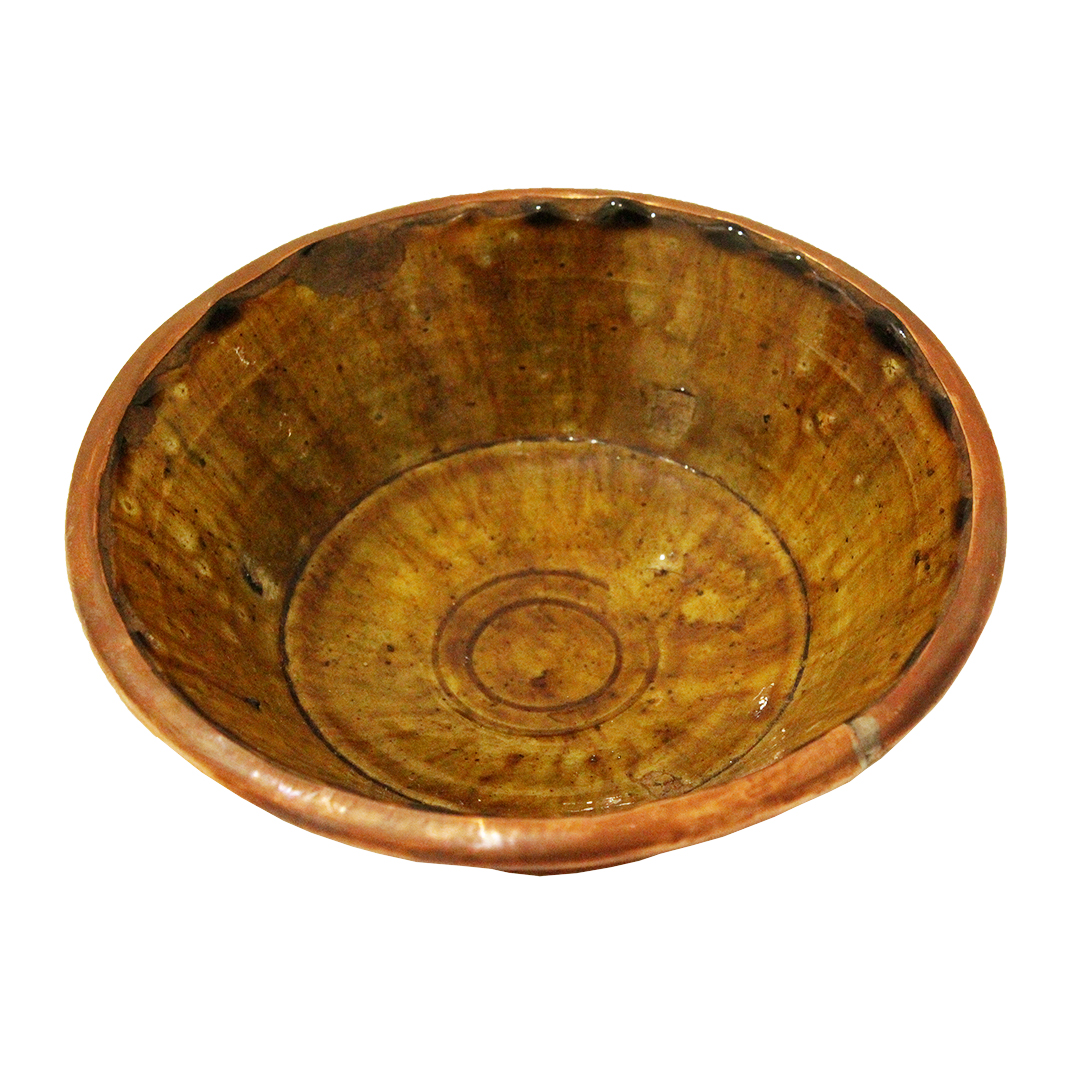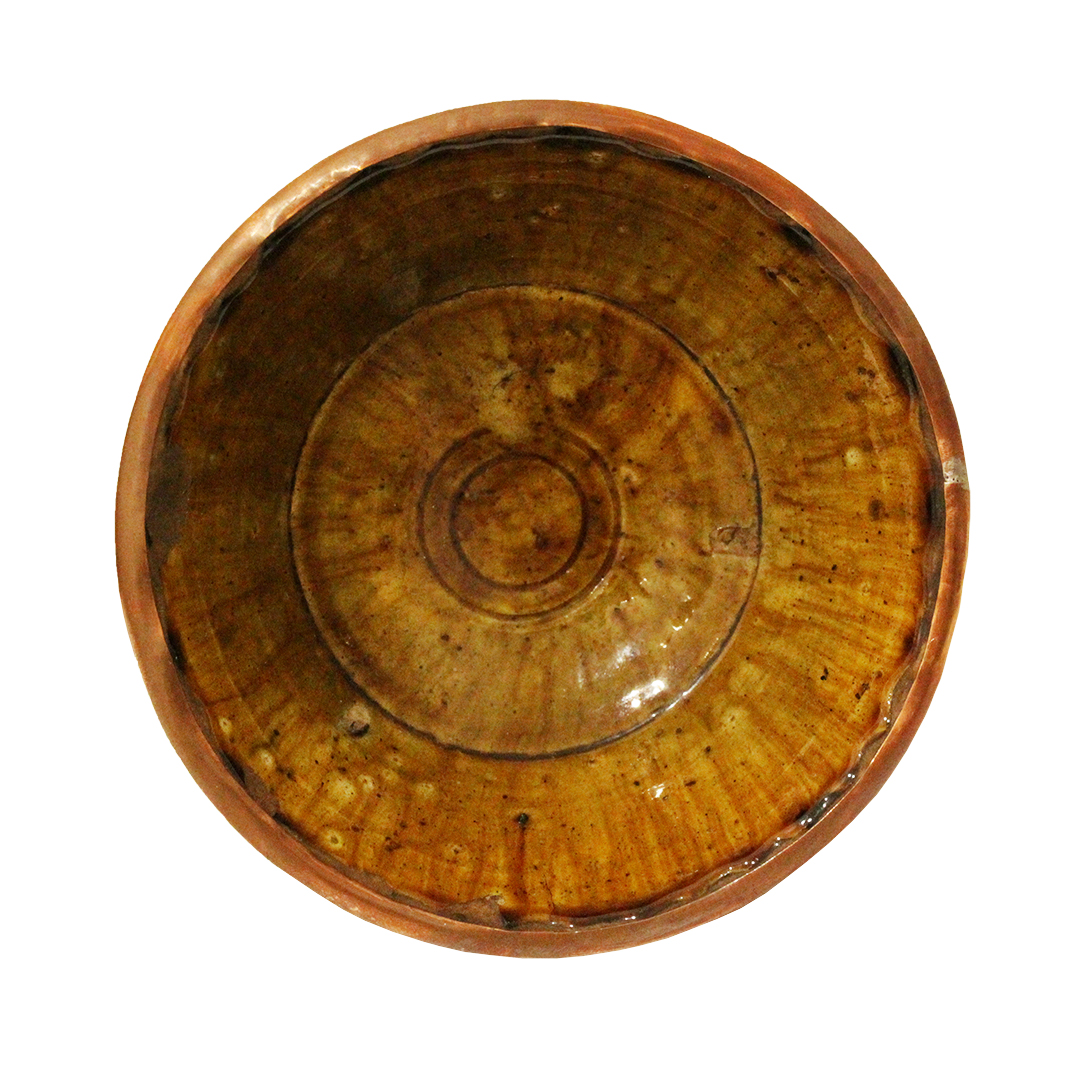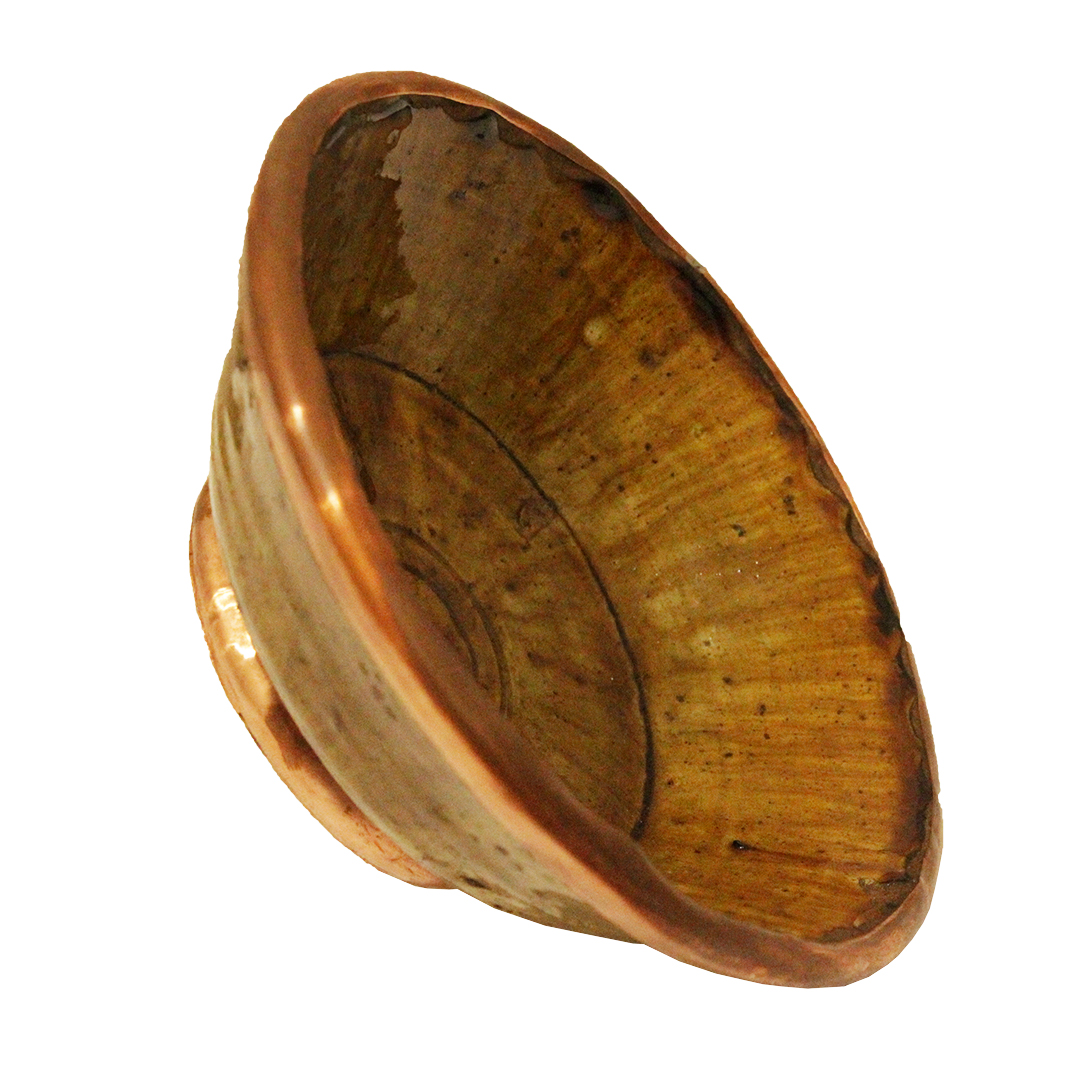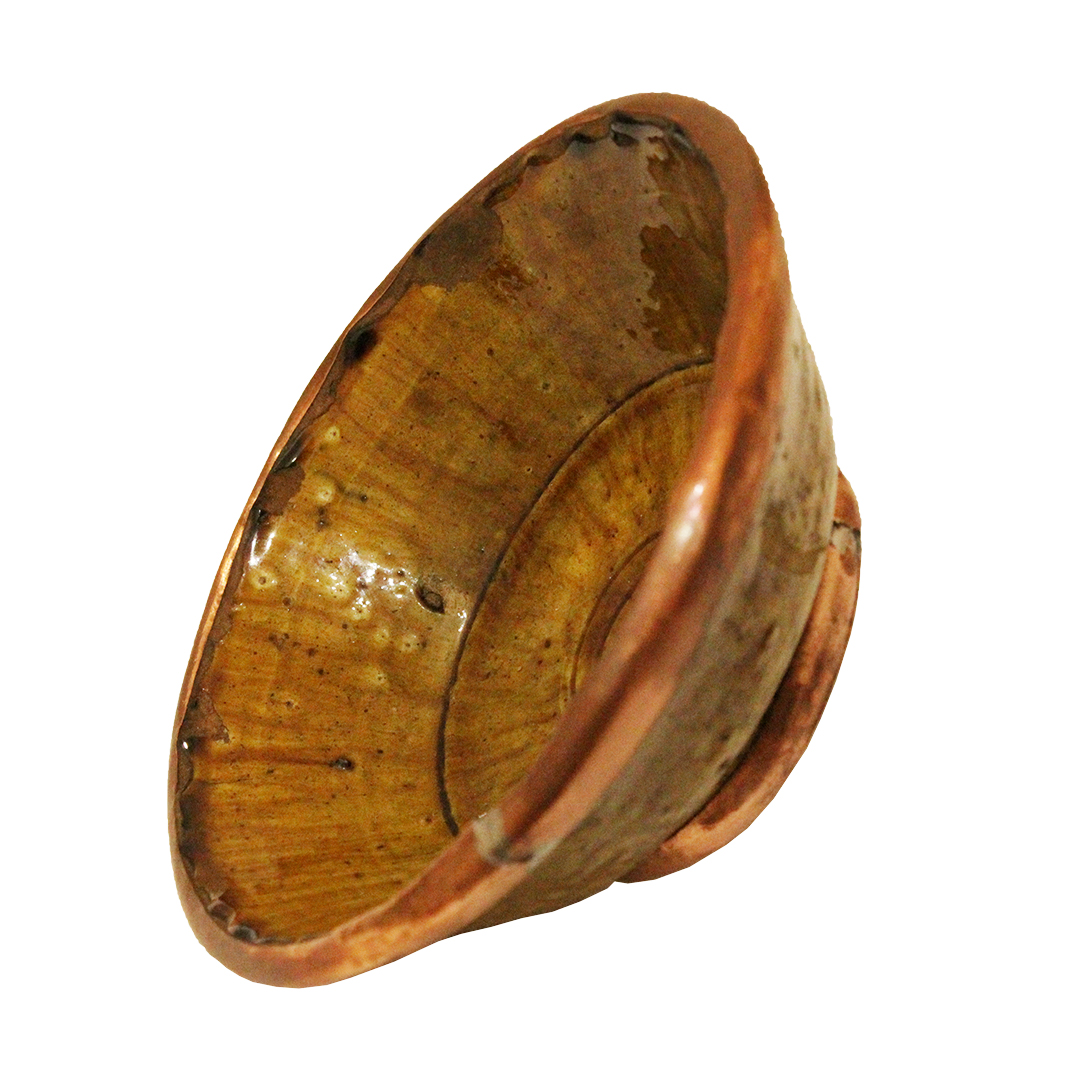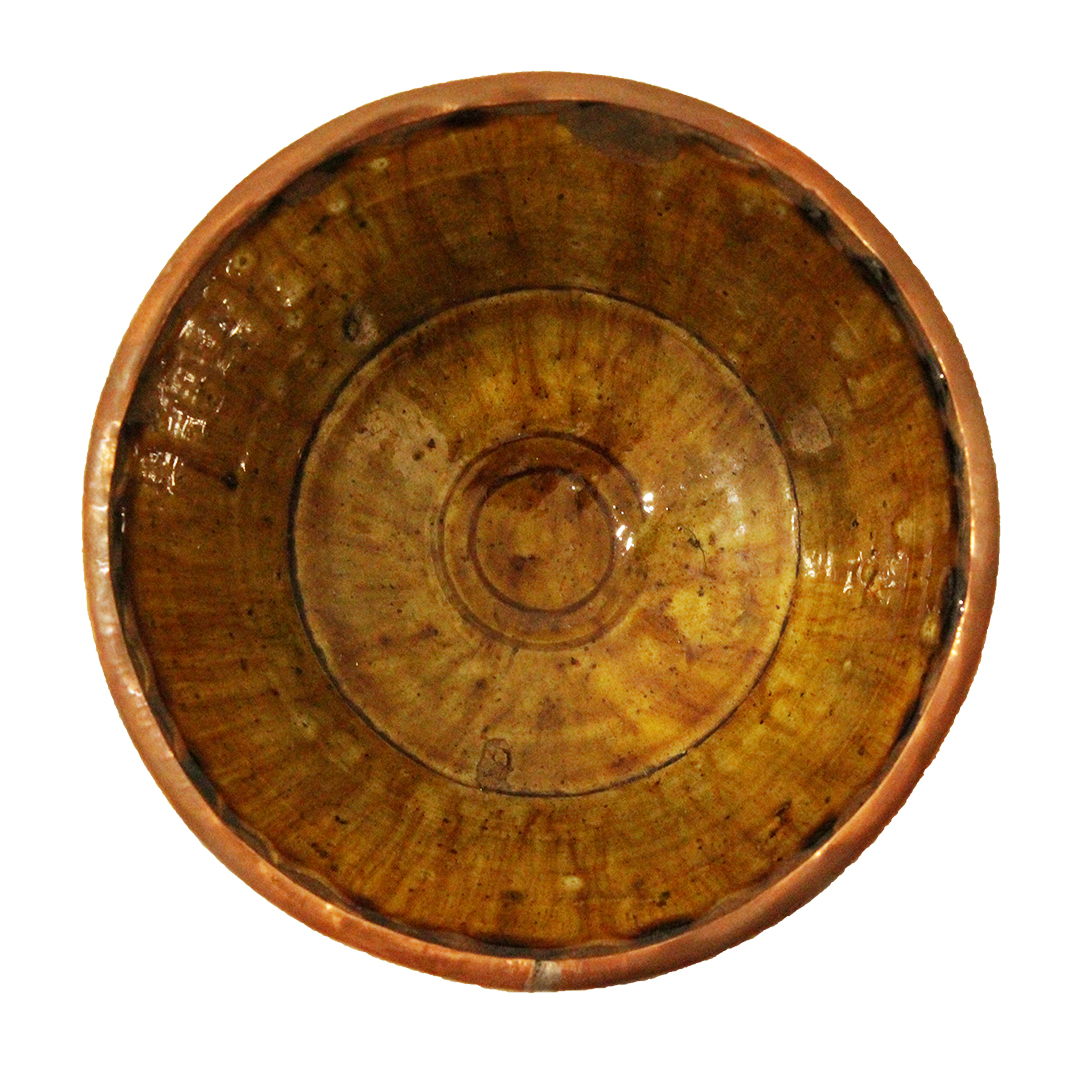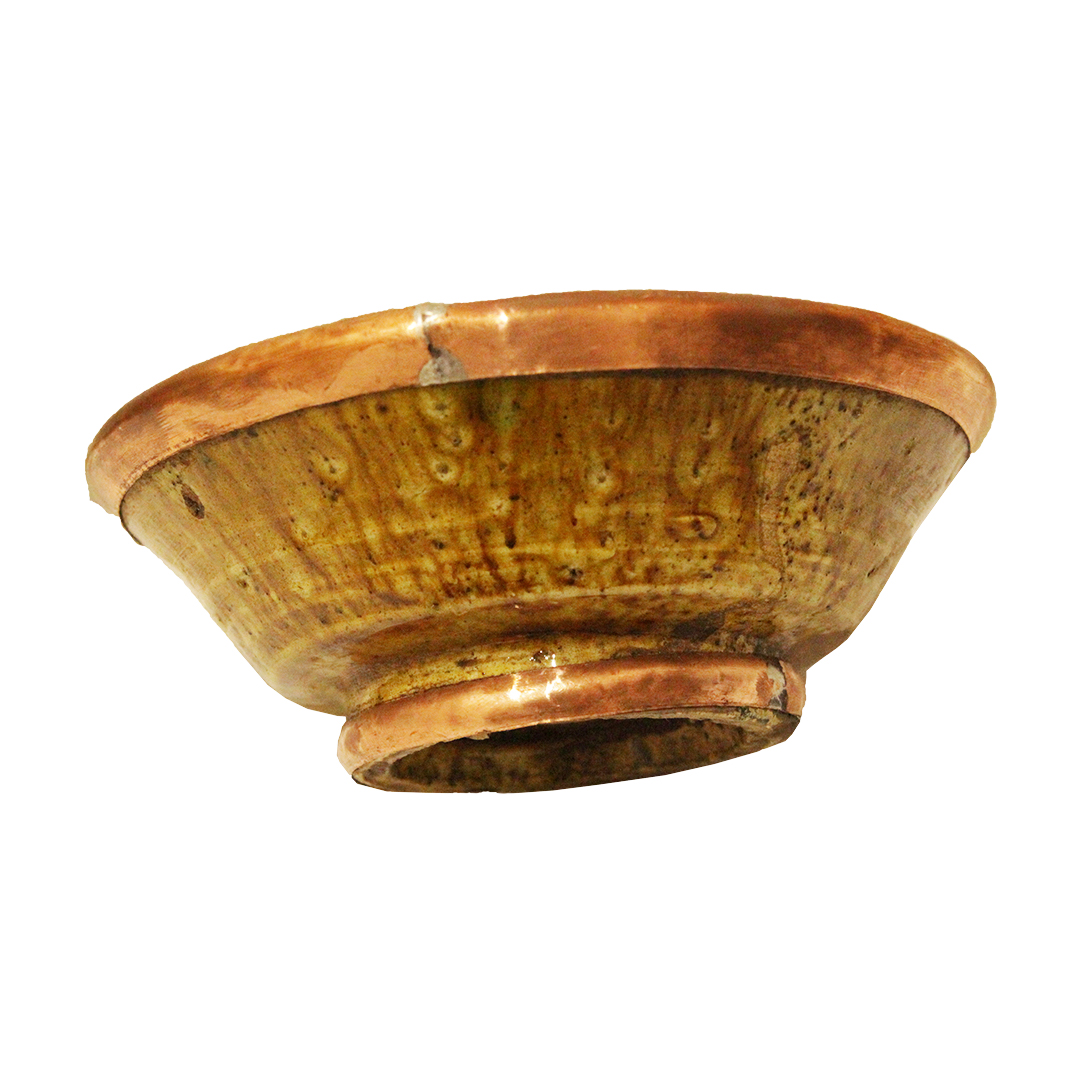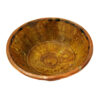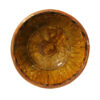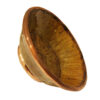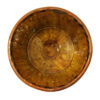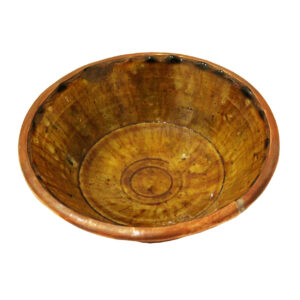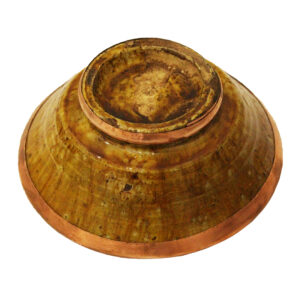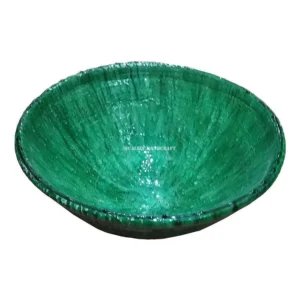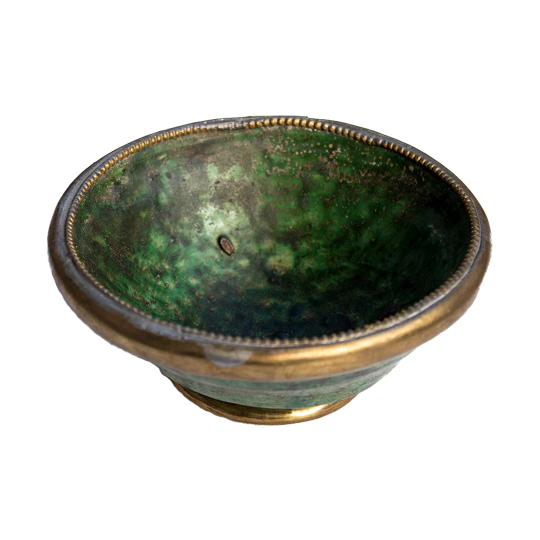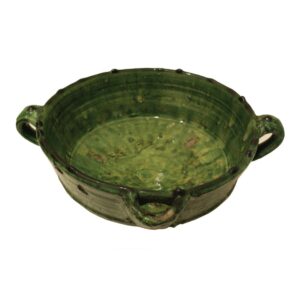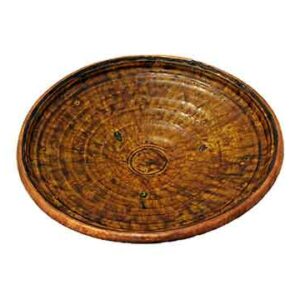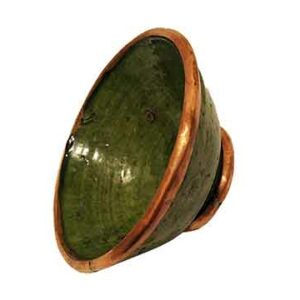Tamegroute Pottery – Unique Elegant Jante Marron BOL JOUNE PETIT with Copper Rim
£81.00
Width: 14CM, Height: 5CM, Weight: 283 Grames
SHARE
Description
The Unique Elegant Green Glaze Tamegroute Pottery Collection represents Luxury Home Furniture in it`s own kind of Beauty in Pottery Designs in it’s Aesthetics, assurance in Quality, Uniqueness originality, sophistication, Signature Marks in 3 areas as a symbolic interaction & self-enhancement representing authenticity of Tamegroute Pottery & Ceramics are tailormade individually to an exceptional high standard by embracing some of the best Artisan Craftsmanship in the world. It takes special skills to create something with your hands, which only a few Artisan craftsmen are gifted with. If you are Intrigued, curious or fascinated by something unusual or mysterious that has been individually handmade by some of the best Artisans in the World The Unique Elegant Green Glaze Tamegroute Pottery Collection with Amazing Pottery Designs – a total & complete secret only known a hand few number of people QualityHandcraft has the Largest Tamegroute Pottery Collection Online in the World, so save the pain in the search for this Amazing & Beautiful Products and – Read On:
Product Details: Jante Marron BOL JOUNE PETIT with Copper Rim
Product: Tamegroute Pottery – Unique Elegant Jante Marron BOL JOUNE PETIT with Copper Rim
Size: – 14cm Width & 5 cm Height
Weight: 283 grams
Material: Glaze, Silicon, Manganese and Copper, Draa River-Bed Water & Clay
Product Code: 108075
The Product in the image is the Exact Product you will receive
Place of Origin: Tamegroute South Morocco
Please note: All products are Handcrafted and may have minor imperfections & Sizes may vary slightly.
100% Original High Quality Handcrafted Elegant Tamegroute Moroccan Green Glazed Pottery
“Imperfection is beauty, madness is genius and it’s better to be absolutely ridiculous than absolutely boring.”- Marylin Monroe
To be like a bee who is attracted to nectarine is nothing new in the world of pottery. As individuals themselves butter up then begin melting into relaxed emotional states at the sight of pottery, the JANTE MARRON BOL JOUNE PETIT WITH COPPER RIM Tamegroute Green Glazed Pottery Luxury Home Furniture imposes its own unique effects. The effect that champions it it’s mind-stammering effect on the carnal-loving part of observers’ minds. This piece of Tamegroute Moroccan Green Glazed Pottery was preserved for only the most influential and high-status owning people in societies for generations upon inception.
Owning such a piece was a luxurious mash of affairs at certain points in history that was strictly left to the privileged few whose made uses ranged from decadent eatery to spellbinding objects of desire for a grooving, almost sensual experience at observation.
Have you wondered why? The inspiring and amazing artisan craftsman manufacturing process was only known by a few families? Just the same as the famous Zelliges of the Fes-potters, these ancient hidden methods JANTE MARRON BOL JOUNE PETIT WITH COPPER RIM Tamegroute Green Glazed Pottery Luxury Home Furniture green glaze with its oddly stark, yet brilliant variations that are always glowing, upending boundaries of edges; up to one thousand shades of green glazed, all almost evoking a different emotional sensation. It is here where colours cross perceptual dimensions and begin to be described as grassy-zest, sweet-lime and devil-green.
But wait, there’s more, if you want to see the most creative, gorgeous and captivating pieces of Moroccan craftsmanship in pottery, ceramics, tapestries, textiles (stringy, tight, rubbery, raspy!), leather, wood and jewellery, then the archaeological and ethnographic shows have proven to be the best places.
The diversified atmosphere of the places themselves along with the breathy detail provided on the deep history, sometimes unsettling and invigorating discoveries of Morocco’s wealth and narratives throughout the eras help elevate the high regard for the works and it might do the same for you.
Let’s dig a little deeper, into one of the royal families, the Royal Sultans of Morocco. The ruling royal families of Morocco from 788 through to the present are known to have used the elegant Tamegroute Moroccan Green Glazed Pottery throughout their raked histories. These families kept them mainly for decoration as well as for dissolute eatery in their lavish palaces and homes because of their extraordinary cashing value. The pottery was among the most ultimate symbols of power and status for the families from that era, and are still regarded as such, and more today.
The booming Kasbah of Tangier Palace, also referred to as the Royal palace of Fez was known to have several JANTE MARRON BOL JOUNE PETIT WITH COPPER RIM Tamegroute Green Glazed Pottery Luxury Home Furniture. Particularly to the associated owners, they believed the works resembled exquisite iridescent forms of architecture and were something they believed they had to have because of their compelling nature.
A lot of the JANTE MARRON BOL JOUNE PETIT WITH COPPER RIM Tamegroute Green Glazed Pottery Luxury Home Furniture have also made it into museums like the Museum of Moroccan Arts in Dar el Makhzen, in Kasbah of Tangier which currently features some of the most powerful and valuable pieces of art in the Arabian and North African world. The high regard for the art is mainly because the manor was once a 17th century palace with a copious, overflowing and sweeping history before it turned into the prized museum it is today.
For those thrown by the fact that pottery (a piece of, or a wholly fired ceramic material that is made up of clay.) can be regarded so highly, it is important to understand what it means for those invested in creating the works as well as why they can be fetched at scary prices.
The clay is usually of many textures from abrasive to caky, enamelled or purely smooth. For creating a piece of ceramicware, a ceramic body is formed into an object of an artist’s desire. Both rough-hand-built as well as wheel-thrown techniques are used, and the object is heated at high temperatures for curing upon completion. That begins an artist’s process of realizing a finished body of art. A work whose history and strenuous process to create has enthralled and freshened people’s animalic emotions for millennia.
Do you know where the true beauty lies with the JANTE MARRON BOL JOUNE PETIT WITH COPPER RIM Tamegroute Green Glazed Pottery Luxury Home Furniture? It lies in the eyes of the beholder. Its sometimes tear-pulling qualities are not a result of observing the pottery itself, but in the thought-jet the observation itself puts forward for an individual to glide through. Experience matters; however, you don’t need to be the master artist to create something elegant or spongy. If you are deeply interested in pottery, it would be the potential inside of you that will shine through when you will craft the art from clay. An interesting thing to note here is that pottery is an efficient way of presenting yourself creatively.
Art has always been known to be a great channelling source for emotion and perhaps the greatest form of expression and humans have known it and have been making art because of it for millennia. You might be thinking about how to get started yourself because these things might sound enthralling. All you need is a little inspiration and something to say, then all else just starts to naturally ungrasp inward and splatter itself onto the object to be worked on outward.
“The aim of art is to represent not the outward appearance of the things, but their inward significance” – Aristotle
The history of the royal kingdom of Fez has become a centre of Islamic and Arab culture throughout the centuries. This region of North Africa has history that is deeply rooted all the way back to the early humans and has been describing the human condition since the beginning of the human being. JANTE MARRON BOL JOUNE PETIT WITH COPPER RIM Tamegroute Green Glazed Pottery Luxury Home Furniture is made by a few chosen craftsmen with a great wealth of experience in the art of True Artisan Perfection who train for years upon years before they set out to realize their works. These craftsmen are found in a tiny village in Tamegroute in the Sahara Desert, North Africa.
This Tamegroute region is famous because of its rough, old-fashioned, bucolic-style earth pottery which it has been producing for generations. Interest in pottery can be viewed in terms of a pregnancy. Once a seed is planted and the best nurture is provided, eventually something delightful with spurge from the grinding work and present itself as defiantly attractive no matter it’s look. True attractiveness shines through every work intended to have worth.
Upon visiting the Tamegroute area in Morocco, there will be the offering to you with an in-depth insight into the pottery-making process and it may perhaps enlighten you regarding several reasons as to why the works are cherished so much in the Arabian and North African world. The pottery is made by hand and so it is not perfect, but the artists have mastered balance in such a way that the composition itself has a peculiar soothing effect despite its lack of neatness and symmetry and it can have flaws in its smooth, fired glazed finish as well as the crisped, pounded and lightly-slammed-on shape itself, with artists often intentionally not opting to fix the distorted effects and sometimes even intentionally introducing it to the work for compositional balance.
After molding, it is cured in a heat-gurgling kiln at 1200 degrees Celsius. However, that was just one part of the story. Each pottery is individually handcrafted to its own uniqueness through its own perfection. Nevertheless, it derives its texture and colour from the specific alchemy created by the potters of Tamegroute which allows for the smelling, touching, feeling, close-observing and tasting of the pottery. The most enjoyable parts for many are the realizations they make in trying to describe the pottery itself with verbs echoed including painful colours and touchy structures. The aroma of freshly used clay coupled with the cold pinch of the shiny pottery is enough to induce a deep relaxation and ever-budding that is difficult to escape once one has been entrapped.
Digging further into the making process, all the raw material used in making the pottery is obtained from nature, including the clay, which is specifically obtained from the fresh Draa river bed which ensures universal consistency. In the ancient times, the glazing technique involved transforming and denaturing silicon, manganese and copper which after baking in hoove-sizes in the ovens with good bigness produces the striking green shades after difficult hours of strenuous natural pressurizing and denaturing to emblazon artistry.
Among other uses of the pottery which were discovered from the chemical studies of the elements used to make the pots included the therapeutic values it is believed to have mainly because of the compounds formed while making the pots like magnesium oxide which was believed to help with heartburn, act as a magnesium supplement and as a laxative.
This would be a defence point for those whose sumptuous qualities were viewed to be overbearing and the maddened qualities of those with status seemed to have been unmade by thick uses of the pottery they admired with tank-force magnitudes. These therapeutic values come about due to the natural process of manufacture which allows for several other chemical reactions to take place which would have been prevented in a more scientific, deculturized and robotic setting.
All these factors make the JANTE MARRON BOL JOUNE PETIT WITH COPPER RIM Tamegroute Green Glazed Pottery Luxury Home Furniture impossible to be replicated by anywhere else in the world. Because pottery and ceramic-making processes are part of an old tradition in Morocco, this contributes to unique designs which are the product of the participation of generations in the art sharing process in this particular part of Morocco, and that means the designs are of the only kind in the world.
Let’s take a further closer look. Tamegroute lies in southern Morocco, just next to the Sahara. In the local Berber language, Tamegroute means, ‘last place before the desert’. This town started growing in the 6th century and is one of the oldest in Morocco because it was a popular trade centre and a part of the great West African Trade Route during Africa’s greatest economic years in the history of mankind. Tamegroute was the last destination for the well-known trade caravans who traversed the desert to Timbuktu using their camels because plumes of smoke coming from the ovens could easily direct individuals to the square where the ateliers are located. That was what made it the doubloon absorbing behemoth of a territory it is was known as at the dizzying times of the trade. That’s only the tip of the iceberg.
In Tamegroute, you will always find men busy with the pottery and in rugged concentration. Most importantly, within this square, you will find seven ovens belonging to seven families involved with pottery. Each family has one oven as well as an atelier made of clay. The Bible says, “No one can serve two masters for you will hate the one and love the other.” The level of devotion placed into running the pottery-making process is of an in-depth nature to the point where the only master that is being served and, for this people, will forever be served is high art.
The sheer amount of dedication to the work is staggering and often raises questions and wonders at how the human brain is capable of such a streamlined mode of thinking for the sole purpose of creation—to some regarded as, the discomforting imitation of what humans believe the gods of the universe should be capable of, yet an achievement of which the people of the world have gifted the gods for epochs upon epochs in hope to prove servility. And so, yet again, the truth lies in the eyes of the beholder and not the maker.
In Tamegroute, tasks and specialty are divided among each family member. Specifically, the entire process of production is in several steps which are carried out in a careful manner. Chunks of clay are dug out of the Draa riverbed and ferried to the turn-ateliers in carts. There is a pit in front of each atelier because the clay is mixed with water. What follows is the stretching of clay on the ground to allow evaporation of moisture. So, it all ends up to this, an experienced potter will precisely know when the clay is ready for kneading. As soon as the clay is perfect and ready, they begin spinning and molding it to form the JANTE MARRON BOL JOUNE PETIT WITH COPPER RIM with Copper Rim Tamegroute Green Glazed Pottery Luxury Home Furniture.
There is a hole dug in every atelier where the potter sits up to his waist. The potters engage in hour-long periods at the wheel; chunk after chunk is kneaded and tamed. The humming goes on for hours as the clay spreads on the master’s hands and is transformed into bowls, vases and cups. Thereafter, the pottery is then stored inside for 24 hours then outside for more time so that it dries. During winter, this process takes a longer time because of low heat as compared to summertime when the heat is too much. As it dries, the potter will make small corrections to the shape when the clay is still moist and fictile.
Tamegroute pottery is only baked once and so the glaze is instantly painted prior to being put in the oven. JANTE MARRON BOL JOUNE PETIT WITH COPPER RIM Tamegroute Green Glazed Pottery Luxury Home Furniture comprises 80% manganese, 19% silicon and 1% copper. The 1% copper made one with the clay out of the Draa river bed is exactly what is responsible for the characteristic transposing green hue described by some as the “daisy duke effect” of the pottery which is marked by a bit more than just the colour.
An irrationally important point to note is that it is good to know that any other type of clay with the same glaze composition will not offer the same result. On the other hand, in selected cases, the copper is replaced with iron oxide to produce more of a brown or olive coloured result which brings for a more rustic effect a lot of people associate with the feeling of internal transformation and not the zen associated with the dragon-green shades.
Every piece of pottery is submerged using the hands and then dried in the sun at its zenith, at this point, the glaze will have a matte blue-grey colour with velvety undertones. Only after it is baked at high temperatures in the oven will it transform to the typical green hue. The ovens are then prepped. Palm branches, wood shavings and sawdust are collected. Triangular pieces of clay are used to separate between different pieces of pottery. When the oven is completely full, it is hermetically sealed with clay.
It gets better, the fire makes the temperature gradually rise and this is important to enable the moisture inside the clay to evaporate slowly. The oven is closely monitored by a man on top of it through the entire process. Under these circumstances, he is able to regulate the temperature by controlling and closing several smoke vents. As soon as the green hue can easily be seen, the wood shavings are added making the temperature rise higher. The oven reaches a maximum temperature of 1200 degrees.
To summarize, there is a rule among potters that the higher the temperature, the more durable the pottery. Alternatively, when JANTE MARRON BOL JOUNE PETIT WITH COPPER RIM Tamegroute Green Glazed Pottery Luxury Home Furniture is well baked, the temperatures are lowered slowly and at a time as the process goes on. After the fire is put out and the oven is cooled for 24 hours, the oven is broken open. What a site it is to observe the pottery emerge from the oven! And yet, little knowledge of science is used, only generations of experience.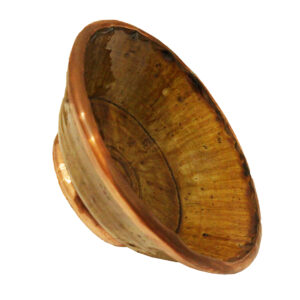
A Precis for the Light Readers
It is not commonplace that customers get to witness and help burgeon natural mystery and subjectivity around the things they buy. The JANTE MARRON BOL JOUNE PETIT WITH COPPER RIM Tamegroute Green Glazed Pottery Luxury Home Furniture offer that magnificent quality that helps propel the product to top must-want lists of pluming zealots around the world. The colour and shape will never be exactly the same for any two and that’s a quality whose rarity we remain blind to because of our fallout in the relationship with the art world upon the birth of intense marketing.
Consumers are so used to attaching rarity with the common things we gush over already only and have forgotten that even the most ordinary sounding objects of our time can sound ethereal, and are sadly often ephemeral. Yes, there are so few Birkins in the world, but there also so few products with over a millennium of history in the making.
There is nowhere else in the world where you will ever find the same result — the very spot in the oven, the same sweaty, browned, and dirt-slapped hands working in the deserts, the exact glaze composition hardened under the Sahara sun, possessed technique and skill of the devoted workers estranged to the far corners of the African continent for cultural consistency and value, and the real history associated with the making of some of the most valuable pieces of work in the Arabian and African world since before slavery became the dark phenomenon it was; crushing the thriving population of the Sahara for heavy trade before spreading to the world at large.
Mark Twain has been close to pottery for long periods of his life and has often commented on the ecstasy-inducing feeling of certain marks on rare pottery. The reasoning behind as to why we go bull-mental at the sight of pottery remains a secret to the general public, but that doesn’t defeat the point. We know it works, we know what it does for us; it’s always good, it’s often great, why not always have it? Why fight the heavy gripping into your core? Why let yourself remain discomforted?
“Art enables us to find ourselves and lose ourselves at the same time.” Thomas Merton
“You Only Expect Greatness” Buy NOW.



